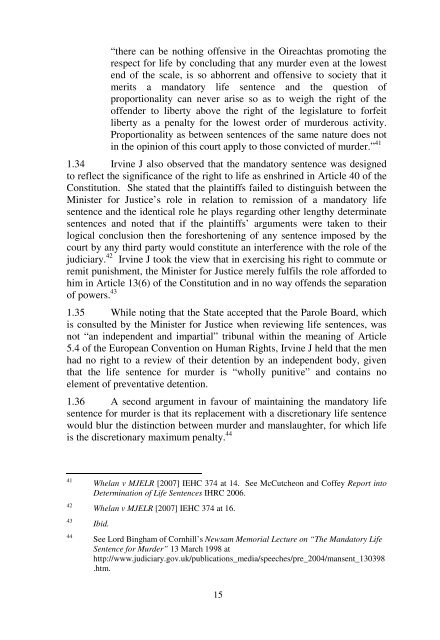murder and involuntary manslaughter - Law Reform Commission
murder and involuntary manslaughter - Law Reform Commission
murder and involuntary manslaughter - Law Reform Commission
You also want an ePaper? Increase the reach of your titles
YUMPU automatically turns print PDFs into web optimized ePapers that Google loves.
“there can be nothing offensive in the Oireachtas promoting therespect for life by concluding that any <strong>murder</strong> even at the lowestend of the scale, is so abhorrent <strong>and</strong> offensive to society that itmerits a m<strong>and</strong>atory life sentence <strong>and</strong> the question ofproportionality can never arise so as to weigh the right of theoffender to liberty above the right of the legislature to forfeitliberty as a penalty for the lowest order of <strong>murder</strong>ous activity.Proportionality as between sentences of the same nature does notin the opinion of this court apply to those convicted of <strong>murder</strong>.” 411.34 Irvine J also observed that the m<strong>and</strong>atory sentence was designedto reflect the significance of the right to life as enshrined in Article 40 of theConstitution. She stated that the plaintiffs failed to distinguish between theMinister for Justice’s role in relation to remission of a m<strong>and</strong>atory lifesentence <strong>and</strong> the identical role he plays regarding other lengthy determinatesentences <strong>and</strong> noted that if the plaintiffs’ arguments were taken to theirlogical conclusion then the foreshortening of any sentence imposed by thecourt by any third party would constitute an interference with the role of thejudiciary. 42 Irvine J took the view that in exercising his right to commute orremit punishment, the Minister for Justice merely fulfils the role afforded tohim in Article 13(6) of the Constitution <strong>and</strong> in no way offends the separationof powers. 431.35 While noting that the State accepted that the Parole Board, whichis consulted by the Minister for Justice when reviewing life sentences, wasnot “an independent <strong>and</strong> impartial” tribunal within the meaning of Article5.4 of the European Convention on Human Rights, Irvine J held that the menhad no right to a review of their detention by an independent body, giventhat the life sentence for <strong>murder</strong> is “wholly punitive” <strong>and</strong> contains noelement of preventative detention.1.36 A second argument in favour of maintaining the m<strong>and</strong>atory lifesentence for <strong>murder</strong> is that its replacement with a discretionary life sentencewould blur the distinction between <strong>murder</strong> <strong>and</strong> <strong>manslaughter</strong>, for which lifeis the discretionary maximum penalty. 4441424344Whelan v MJELR [2007] IEHC 374 at 14. See McCutcheon <strong>and</strong> Coffey Report intoDetermination of Life Sentences IHRC 2006.Whelan v MJELR [2007] IEHC 374 at 16.Ibid.See Lord Bingham of Cornhill’s Newsam Memorial Lecture on “The M<strong>and</strong>atory LifeSentence for Murder” 13 March 1998 athttp://www.judiciary.gov.uk/publications_media/speeches/pre_2004/mansent_130398.htm.15
















